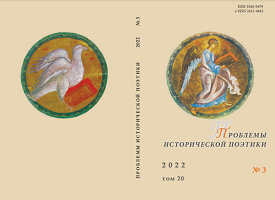Истоки и образное воплощение имперского сознания М. Ю. Лермонтова
The Origins and Figurative Embodiment of the Mikhail Lermontov’s Imperial Consciousness
Author(s): Irina Anatolievna Kiseleva, Ksenia A. PotashovaSubject(s): Cultural history, Russian Literature, 19th Century, Theory of Literature, Sociology of Literature
Published by: Петрозаводский государственный университет
Keywords: M. Yu. Lermontov; “The Tale of Bygone Years”; Russian statehood; “Eastern text”; Patriotic War of 1812; history; Caucasus; motive, genesis; imperial idea; Tsargrad;
Summary/Abstract: The purpose of this article is to reveal the historical concept of M. Y. Lermontov in the context of the ideas of his time, and to identify the historiosophical motives of his work. The central place is given to the understanding and genesis of the image of Russia as a country of the North and Russians as “sons of midnight.” The connection of Lermontov’s texts with the “Tale of Bygone Years,” the odes of G. R. Derzhavin, the works of his contemporaries A. F. Merzlyakov, V. A. Zhukovsky, A. S. Pushkin is traced in the context of assimilation of the statehood ideas, an understanding of the historical place of Russia as a Christian empire, an awareness of the specifics of Russia’s relations with the Eastern and European world. The article presents the characteristics of the state sentiments in the 1830s associated with the understanding of the tense political situation on Russia’s European and North Caucasian borders, an awareness of the importance of national history and the rise of national consciousness, the assertion of the idea of Russia’s beneficial influence for the socio-cultural development of the peoples taken under its patronage. Lermontov is the heir of the literary and cultural tradition proper, dating back to the Old Russian literature with its ideas of Orthodox statehood and God-chosen Russia as the successor of the Byzantine Christian Empire. The article focuses on poems related to the Patriotic War of 1812, as well as the actions of the Russian army in the Caucasus. The “Borodino Cycle” and Lermontov’s “oriental text” are intertwined in a host of patriotic motives conditioned by the state character of Lermontov’s historical thinking. In Lermontov’s work, cultural references to the idea of Moscow as the Third Rome are indicated. The poet is represented as the bearer of the imperial consciousness, which is based on the dominance of the idea of Russia as an Orthodox power. The actualization of imperial ideas in Lermontov’s work is connected with his vivid perception of the interaction between Russia and the West (Europe), and Russia and the East (Caucasus) in his times.
Journal: Проблемы исторической поэтики
- Issue Year: 20/2022
- Issue No: 3
- Page Range: 87-100
- Page Count: 14
- Language: Russian

